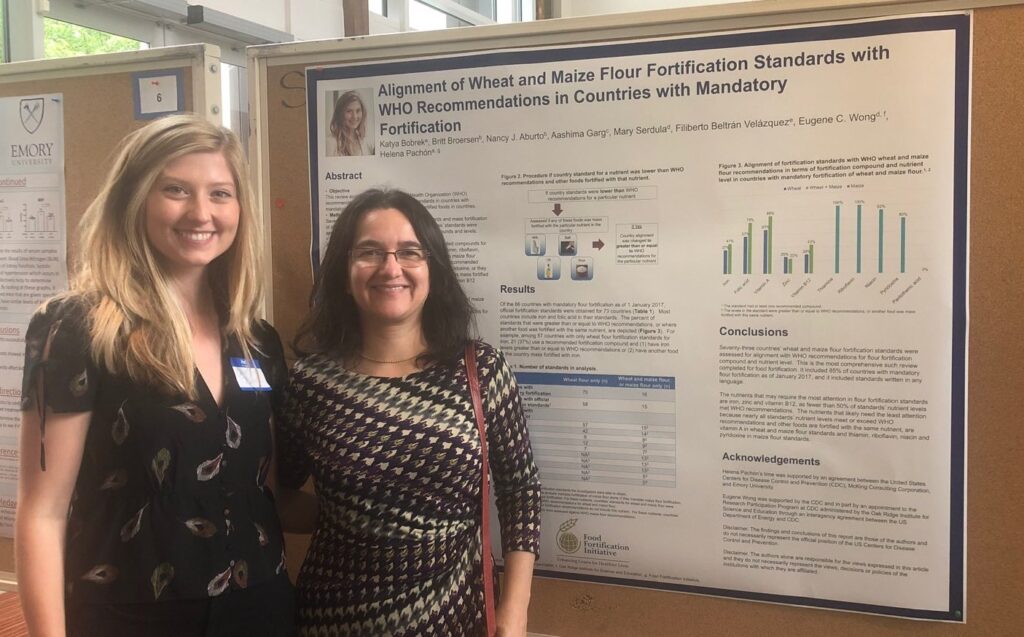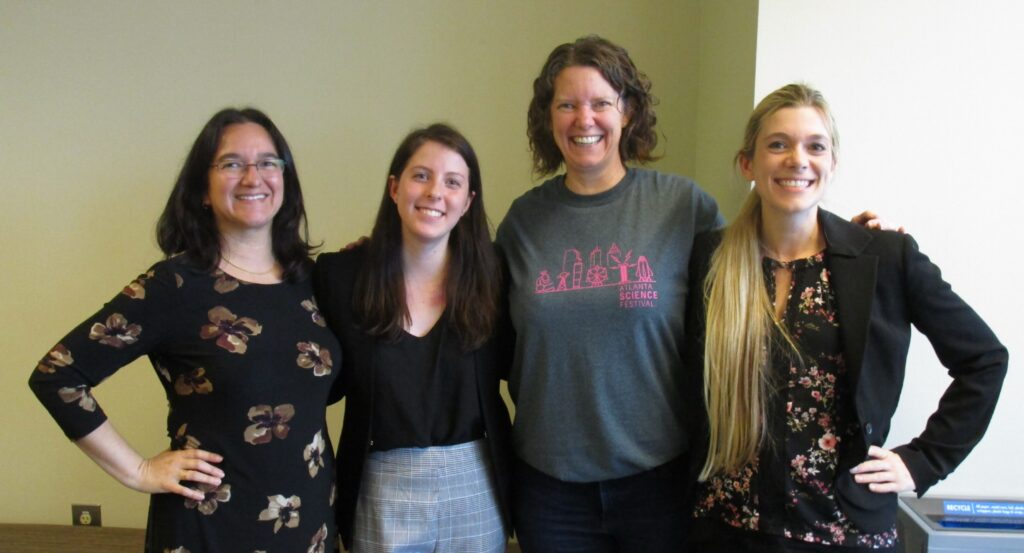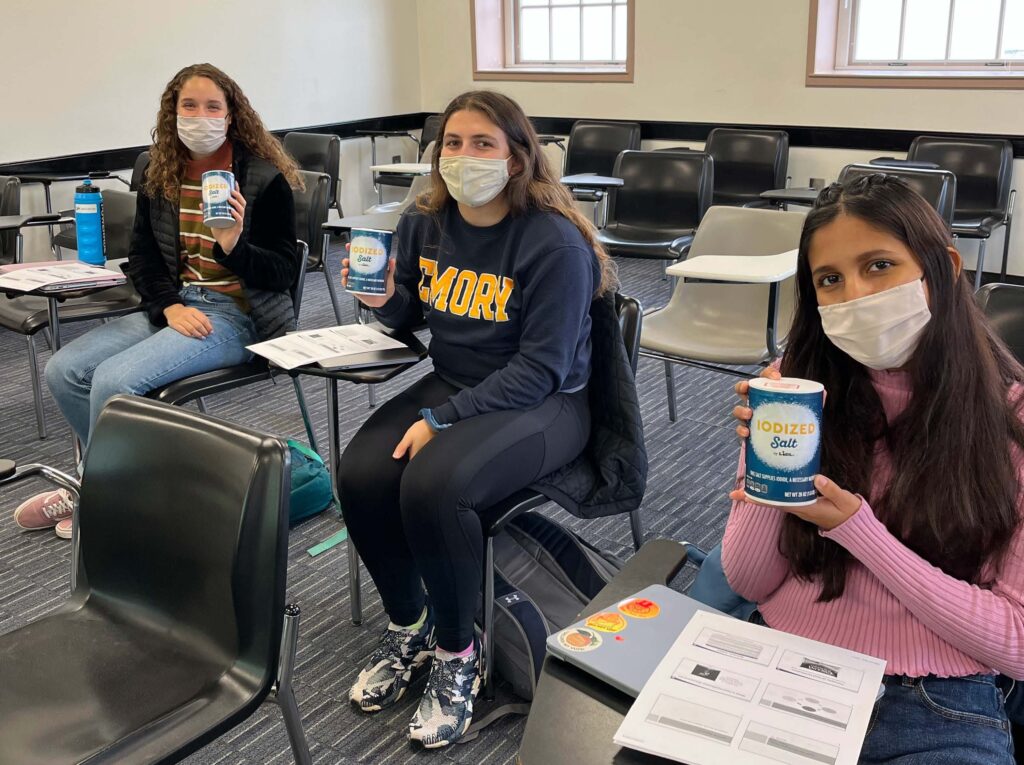News Team member Stephanie Oehler describes how the online "trad-wife" aesthetic fuels the flames of the anti-vaccination movement during the second-largest measles outbreak of the 21st century.
Three Undergrad Research Projects and the Professor who Mentored Them To Publication
By Gabrielle Stearns
Students come to college to learn, explore, and begin developing their careers, both in and out of the classroom. At Emory, about 60 percent of undergraduate students achieve these goals by participating in faculty research, according to Emory’s College of Arts and Sciences. Some find opportunities through established programs, such as the Scholarly Inquiry and Research Experience (SIRE) program, while others independently build connections with faculty researchers.
Students who work with Helena Pachón, PhD, MPH, a professor at Emory’s Rollins School of Public Health and instructor in the Center for the Study of Human Health, receive valuable research experience, individualized mentorship, and the opportunity to be published very early in their science careers. In her 11 years at Emory, Dr. Pachón has brought several undergrad students into existing projects, helped them design their own studies, and provided research opportunities in classroom settings.
Dr. Pachón’s specialty is food fortification, or adding vitamins and minerals to food to improve nutrition. Most undergraduate students have no prior experience in this topic, but Dr. Pachón still encourages them to take a leadership role and be involved in all steps of the research process, from ideation to publication.
“Being able to train and guide a student through a research process is very rewarding,” Dr. Pachón said, and the students find it rewarding as well. Undergraduate students involved in three of Dr. Pachón’s recent research projects shared the value of the experience and the impact it has had on their futures in science.

Katya Bobrek: Independent Study Researching National Flour Fortification Standards
Katya Bobrek (19C, 25MD) was an Anthropology and Human Biology major with a curiosity about public health research. That curiosity led her to cold-email Dr. Pachón and ask to hear more about her research. Bobrek was invited to join Dr. Pachón’s team as a sophomore and received independent study credit until she graduated.
Bobrek helped to analyze the flour fortification standards of 72 countries compared to the guidelines provided by the World Health Organization (WHO). Wheat and maize flours are commonly fortified with nutrients like iron, folate, zinc, and more to help prevent dietary deficiencies. The WHO provides guidelines for the types and quantities of compounds that should be added to flour. Bobrek worked with Dr. Pachón and collaborators from the WHO, the Centers for Disease Control and Prevention, UNICEF, and the World Food Programme to assess if countries were meeting the WHO’s recommendations and to inform policy and programs to improve nutrition.
Bobrek graduated before the research was complete, but she was able to stay with the project during her gap year and until its publication in Food Policy in 2021. Her focus has changed from preventative health research to medical school, but she still values the time she spent doing research with Dr. Pachón.
“I’m probably not going to go into flour fortification as a career, but it’s something that precipitated so much in my professional life,“ Bobrek said. “The project with Dr. Pachón was my entrance into medicine and health in general. It put me on the path to med school.”
She advises other undergraduate students to get involved in faculty research if they can. “The research you do in undergrad doesn’t have to be exactly what you’re going to do forever,” she said, “but it can help you form your goals and passions.”

Rachel Greenwald: Honors Thesis Comparing National and Global Salt Iodization Standards
Rachel Greenwald (20C) also connected with Dr. Pachón by cold-emailing professors who were doing research that interested her. Dr. Pachón’s focus on food fortification fit perfectly with Greenwald’s interest in preventative health. They spent the summer before her senior year brainstorming a research project that eventually evolved into an honors thesis.
Greenwald’s research analyzed salt iodization standards in 110 countries and compared them to global guidelines set by the WHO. Iodine deficiency has been increasing in the US in recent decades and poses serious health risks, particularly to pregnant women and their unborn children. It is relatively cheap and easy to fortify salt with iodine, making iodized salt a common public health strategy to prevent deficiency.
The results of Greenwald’s analysis showed most countries’ standards were in line with the WHO’s recommendations. Greenwald received feedback from her honors thesis defense that helped her write a manuscript of the research, which she published in Current Developments in Nutrition about two years later.
Greenwald is now a clinical research coordinator in the Emory University School of Medicine Department of Urology. The skills she learned from working with Dr. Pachón are still directly related to the work she is doing now.
“[The research] made a tremendous impact on my attention to detail, my critical thinking skills, and being able to look at research and analyze it,” she said. “I would really encourage undergrads to do their own research. The pride you feel with having your own work and putting so much time into something that you’re really interested in doing and making it your own was just a really good experience.”

Arantxa Bonifaz Rosas & Josie Uerling: Extra Credit Project Comparing Salt in Magazine Recipes
Arantxa Bonifas Rosas (24C) and Josie Uerling (22C, 24MPH) stumbled upon their opportunity for undergraduate research. Both students enrolled in HLTH 350R: Core Issues in Global Health with Dr. Pachón in fall 2021, the capstone class for Global Health, Society, and Culture minors. Bonifas Rosas and Uerling were expecting a typical classroom experience. Instead, Dr. Pachón pitched a research idea to the group and offered extra credit to anyone who wanted to get involved. All four students in the class accepted the challenge.
This research also focused on salt iodization. Students looked at salt-containing recipes printed in eight of the most circulated magazines in the US. They found that none of the recipes specified iodized salt in the ingredients list, revealing an untapped opportunity to promote iodine consumption.
Their research was published in the International Journal of Environmental Research and Public Health in March 2023. Most of the students had already graduated by then, but Arantxa was still in her third year at Emory. She has the rare experience of being a published author while still an undergraduate.
“It’s a really cool opportunity to be able to say that you were published during your undergrad years,” Bonifas Rosas said. She particularly appreciated getting her research experience in a classroom environment: “If I were to do it alone, it would have been very overwhelming. But having [Dr. Pachón] guide us through it was very helpful.”
Some of the students currently are working with Dr. Pachón to write an op-ed recommending that magazines begin specifying the use of iodized salt in their recipes. Uerling, who is now beginning her second year at Rollins School of Public Health, is one of these students and will present the research this fall at The Micronutrient Forum 6th Global Conference at The Hague in the Netherlands.
“It’s very valuable to see how the research can actually impact people and potentially produce a change,” she said. “I like being able to take this next step, put this into practice, and see how we can disseminate this information to people who can use it and hopefully benefit from it.”

